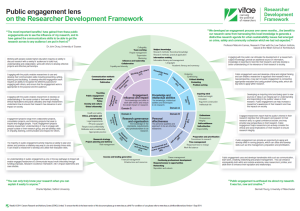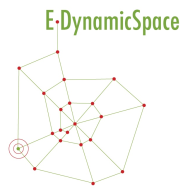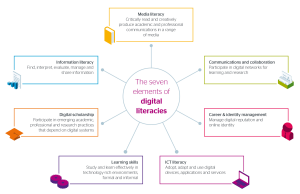Today I went up to Birmingham to attend (for the first time) to the 34th meeting of this group. The topic today: Developing employability, this project is of course linked to Building digital capability as well as to my own idea of personal learning environment for undergraduate students and it is an extension of this study.
Initial ideas (of the Jisc community) to share are:
- How can HE engage in developing ways in which students can articulate the skills they learn throughout their degree for their future employability?
- Students articulating their own development, a self-directed process or self determined, as Lisa Blaschke would prefer to say. Look it up in this link. Here is their community of practice, worth looking at.
- What does maturity look like in students in relation to their digital skills? This can also be related to the self-determined learning?
- It should be a learner centre approach where students need to reflect and write about the evidence of their digital skills acquired throughout their university learning
- Digital technology enhances employability, therefore there is a need to embed digital technology in authentic learning and then reflect and pin out the skills learned.
Some twits
From the digital students project
Themes emerged from the students survey
- Students need ongoing support: “We need ongoing development” [here is where my idea of a scaffolding structure fits in very nicely 🙂 ]
- “We expect the same or better services as in school”(this idea comes from a research project lead by David White and Joanna Wild in partnership with Jisc: Incoming Expectation of the Digital Environment Formed at School)
- “Don’t assume I am digital literate” (again a good point to justify my idea)
- Having discussions with staff how they can work collaboratively for some digital strategies to move forward to the development of those skills
- “We expect college to provide what we need”
- “We expect modern learning resources that are easy to use” (video, podcast, youtube videos)
- “Consistency across all courses”
- “We want to work with lecturers” (2nd year learners to co-design the module, use their skills to design the course)
- “Treat us as going up, we want to contribute”
- “Ask us what we need” Their voice is feeding into what the college is doing in relations to the digital experience
Recommendations:
- How can colleges undertake evaluations of learners use of tech? How can colleges engage learners in the process?
Southwest College Northern Ireland is an example to look at. They closed their campus for a week so they could train their staff in that week.
Afternoon session
Building digital capability / Developing students digital capability. Sarah Davies
Initial consultation is needed to start the project
Digital capability framework : What it would be like? To what skills am I setting questions to? It is about upscaling the staff digital skills?
What would your pathway be through this triangle?
digital capabilities framework: Functional roles in staff
- Leadership

- Administration, operations
- IT facilities infrastructure
- Content/knowledge management
- Research and scholarship
- Teaching and learning support
- Staff/educational development
- Public engagement/communication (Vitae useful material and another useful PDF for public engagement)
Session 2: From prospect to Alumnus challenge.
Looking at the journey from beginning to end of students.
What are those phases and how is the path through it?
Looking to improve that journey. Where are the problems in that journey?
How to optimise those stages?
Badges that can help with the connection of learning and employability. I think that badges are an interesting topic to look at. Mozilla is doing excellent work not only with open badges but also with what they call Web Literacy and Jisc has done another bit which of course is worth taking a look!
An interesting activity was reading the digital capability framework and their draft definition of the elements of digital capability and see if we had any suggestions
- ICT proficiency / fluency: Adopt, adapt/develop and use ICT-based environments, devices, applications and services;critically assess benefits/constraints; design and implement ICT solutions; recover from failures; stay up to date with ICT relevant to role; computational thinking(coding; algorithm, etc)
- Information and data literacy: Find, evaluate, interpret, manage, curate, organise (i.e. through filing, tagging) and share digital information (curate) including open content; collate, manage and analyse digital data including leaner and organisational data; be aware of digital copyright/IP issues; be aware of legal, ethical and security issues.
- Media literacy: Critically read and creatively produce academic and professional communications in a range of digital media; appreciate relevant aspects of digital design including cadence, purpose, accessibility, impact, modality; understand digital media production as a practice and an industry
- Networking and digital participation: participate in digital teams and networks for learning, teaching, research, public engagement (Sconul and vitae guidelines for public engagement)professional practice; collaborate effectively using digital tools; appreciate different cultural social and communicational norms online; build and enable digital teams, groups and networks.
- Digital research and innovation (digital scholarship): Collect and analyse data using digital methods; discover, develop and share new ideas using digital tech; undertake open scholarship; design new research questions and programmes around digital issues/methods; develop digital tools and processes.
- e-Learning and professional development: Teach, train, coach and support others to learn, in online and blended spaces, using digital tech as appropriate; use digital means to assess and give feedback; undertake own learning/PD using digital tech as appropriate; design learning courses and activities that make effective education use of digital technologies.
- Digital reputation and identity management: Project a positive digital identity and manage digital reputation across a range of platforms; collate digital evidence of achievement; support others to manage and project positive digital identities.
- Digital wellbeing: Look after personal health, safety, relationships and work-life balance in digital settings; promote e-safety and responsible use to others; manage stress, workload and attention/distraction in a digital environment(this is repetitive) consider environmental impacts of digital technologies and activities.
There is a need for me to look at other frameworks (on digital literacy in order to see which fits best for what I am looking at.
One idea I came to in the discussion is that the E–Ddynamic.SpLace 
needs to serve as a “reflective space” for students to articulate the skills they are learning in the process of designing, developing and implementing their PLE. It can be a reflective space to -amongst other things- pin down the skills learned, the higher order thinking involved in each task, etc. Maybe through my work I could refine those definitions and say more about them once I have collected and analysed the empirical evidence. Then I hopefully will now better what a strong framework can be in order to pin down what does it mean to be digital literate.
It appears again and again –> Emergence as a property of the network I will look at. (I see the PLE in itself as a network, the classroom is also a network and the PLE’s interacting with each other sharing, collaborating, creating knowledge is another network. This needs deep theoretical thinking)
Jisc came with 7 challenges in enhancing the digital experience of students:
- Take a strategy whole-institution approach to developing the student digital experience
- Deliver a relevant digital curriculum
- Prepare and support students and staff to study and work successfully with digital technologies
- Develop coherent policies for “bring your own” device, service and data.
- Deliver a robust flexible digital environment
- Deliver an inclusive student experience
- Engage in dialogue with students and empower them to develop their digital environment (this is what my project is about)
It is in 2+7 that I am interested. I think that skills are learned best when they are embedded in an every day activity and that students ought to be empowered and heard as I believe they have an enormous potential as designers of their digital environment.
Following the link from the tweet many examples of effective practice can be found
The slideshare from Helen Beetham: ‘how can we meet the needs of digital students’
Here the link to the Jisc project with links and theoretical sources for developing digital literacies.
To summarise the event here is the storify told by Sarah Knight.
At the end for me it is all about connecting the dots and, so I draw my dots…
Follow the link to the slides and presentations of the event for more details on the different topics



